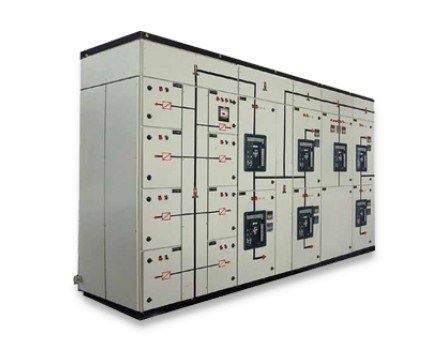
Understanding Motor Control Centre Panels And Power Control Centre Panels
Read Count : 286
Category : Blogs
Sub Category : Miscellaneous
In industrial settings, where machinery and equipment play a pivotal role, efficient management of electrical systems is paramount. Among the essential components of these systems are Motor Control Centre (MCC) Panels and Power Control Centre (PCC) Panels. These panels serve distinct yet interconnected functions, contributing to the seamless operation of industrial processes. Let's delve deeper into their roles, functionalities, and significance in modern industrial setups. Motor Control Centre Panels (MCC Panels) Motor Control Centre Panels, often abbreviated as MCC Panels, are integral to controlling and monitoring motors in industrial environments. These panels serve as centralized hubs for managing the operation of multiple motors within a facility. Whether it's starting, stopping, speed regulation, or protection against electrical faults, MCC Panels provide comprehensive control over motor-driven machinery. Functionality of MCC Panels: 1. Motor Start/Stop Control: MCC Panels facilitate the initiation and termination of motor operations. Through various control mechanisms such as contactors and starters, operators can precisely manage motor functionalities according to operational requirements. 2. Speed Regulation: In applications demanding variable motor speeds, MCC Panels incorporate frequency drives or soft starters. These components enable smooth and controlled acceleration or deceleration of motors, optimizing energy consumption and enhancing operational efficiency. 3. Overload Protection: Ensuring motor safety is paramount in industrial settings. MCC Panels integrate overload relays and protective devices to safeguard motors against excessive current flow, overheating, or other potential hazards, thereby minimizing the risk of equipment damage and downtime. 4. Remote Monitoring and Control: With advancements in automation technology, modern MCC Panels offer remote monitoring and control capabilities. Through connectivity features such as Ethernet or Modbus communication protocols, operators can monitor motor parameters, diagnose faults, and execute control commands from a centralized control room or even remotely via mobile devices. Significance of MCC Panels: 1. Enhanced Operational Efficiency: By centralizing motor control functions, MCC Panels streamline operational workflows, reduce manual interventions, and optimize resource utilization, thereby enhancing overall productivity and efficiency in industrial processes. 2. Improved Maintenance Practices: MCC Panels facilitate proactive maintenance practices by providing real-time diagnostics and predictive alerts regarding motor performance and health. Timely identification of potential issues enables preventive maintenance measures, minimizing unplanned downtime and repair costs. 3. Safety and Compliance: With built-in protective features and adherence to industry standards and regulations, MCC Panels ensure a safe working environment for personnel and compliance with electrical safety norms, fostering a culture of workplace safety and regulatory adherence. Power Control Centre Panels (PCC Panels) Parallel to MCC Panels, Power Control Centre Panels (PCC Panels) play a pivotal role in managing and distributing electrical power within industrial facilities. Unlike MCC Panels that focus on motor control, PCC Panels oversee the distribution of power to various equipment, machinery, and auxiliary systems, ensuring reliable and uninterrupted power supply across the facility. Functionality of PCC Panels: 1. Power Distribution: PCC Panels serve as distribution hubs for electrical power, receiving power from the main source such as transformers or generators and distributing it to different loads and circuits within the facility. Circuit breakers, switchgear, and busbars facilitate the seamless flow and distribution of power. 2. Load Management: PCC Panels enable efficient management of power loads by distributing power based on demand and priority. Through selective switching and load shedding mechanisms, operators can balance power distribution to prevent overload conditions and ensure optimal utilization of available resources. 3. Fault Detection and Isolation: In the event of electrical faults such as short circuits or overloads, PCC Panels incorporate protective devices such as relays and circuit breakers to detect and isolate faulty circuits promptly. This minimizes the impact of faults on overall system operation and enhances system reliability. 4. Energy Monitoring and Optimization: PCC Panels often integrate energy metering and monitoring functionalities to track power consumption across different sections of the facility. By analyzing energy data and identifying consumption patterns, operators can implement energy-saving measures and optimize power usage, contributing to cost reduction and sustainability efforts. Significance of PCC Panels: 1. Reliable Power Distribution: PCC Panels play a crucial role in ensuring reliable and uninterrupted power distribution within industrial facilities. By efficiently managing power loads and implementing protective measures, PCC Panels minimize the risk of power outages and disruptions, thereby supporting continuous operations. 2. Flexibility and Scalability: With modular design and configurable configurations, PCC Panels offer flexibility and scalability to adapt to evolving power distribution needs and expansion requirements within industrial facilities. This scalability ensures future-proofing and accommodates growth without significant infrastructure overhaul. 3. Compliance and Safety: PCC Panels adhere to stringent safety standards and regulations, ensuring compliance with electrical codes and norms. By incorporating safety features such as fault protection and isolation, PCC Panels mitigate the risk of electrical hazards and prioritize personnel safety within the industrial environment. In conclusion, Motor Control Centre Panels (MCC Panels) and Power Control Centre Panels (PCC Panels) are indispensable components of modern industrial electrical systems. While MCC Panels focus on motor control and optimization, PCC Panels oversee power distribution and management, ensuring reliable and efficient operation of industrial processes. By understanding their roles, functionalities, and significance, industrial operators can leverage these panels to enhance productivity, efficiency, and safety across their facilities.
Comments
- No Comments

